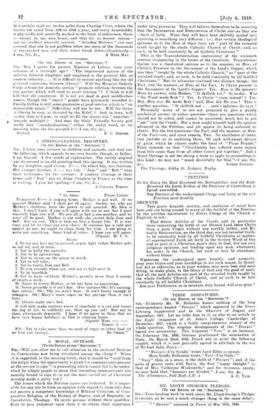A MORAL OUTRAGE.
[To THE EDITOR OF THE " SPECTATOR."] ETTR,—Will you allow me to call attention to the enclosed Petition to Convocation now being circulated among the clergy P When it is suggested, in the covering letter, that it should be "read from the pulpit'when the opportunity is given for communicants present at the service to sign "—a proceeding which cannot fail to be under- 'toed by simple people to mean that intending communicants are morally bound to sign it—is not the most sacred act of Christian worship made a party test ?
The issues which the Petition raises are technical. It is impos- sible for any One to form an opinion with regard to them who does not possess a competent knowledge of Biblical Criticism, of Com- parative Religion, of the History of Dogma, and of Dogmatic, or Speculative, Theology. To invite persons without these qualifica- tions to pass judgment upon them is to obtain their signatures under false pretences. They will believe themselves to be asserting that the Incarnation and Resurrection of Christ are—as they are —facts of faith. What they will have been skilfully misled into asserting is something very different : i.e., that certain theological opinions as to the How of these facts are " part of the revealed truth taught by the whole Catholic Church of Christ; and, as such, to be held constantly by all faithful Christians."
This is the Transubstantiation controversy of the sixteenth century reappearing in the terms of the twentieth. Transubstan- tiation was a theological opinion as to the manner, or How, of Christ's Presence in the Sacrament of the Lord's Supper, which was then " taught by the whole Catholic Church," as " part of the revealed truth; and, as such, to be held constantly by all faithful Christians." But its advocates confused two distinct things: the Fact, and the manner, or How, of the Fact. Is Christ present in the Sacrament of the Lord's Supper? Yes. How is He present? Here we answer, with Hooker, "It skilleth not." So to-day. Was " the Word made flesh" ? Yes. Is Christ " risen indeed" ? Yes. But, How was He made flesh ? and, How did He rise ? This is another question. "It skilleth not . . . men's opinions do vary." Personally many of us are not prepared to give a purely symbolical answer to either question—there are questions which should not be asked, and cannot be answered; much less to put "not" into the Creeds. But a man might himself hold the opinion advanced in the Petition, and yet oppose its being enforced on others. For the two questions—the Fact, and the manner, or How, of the Fact—are, and must remain, Two. No excellence of inter!. tion justifies us in confusing them. Of such well-meant device! of piety, which he classes under the head of " Pious Frauds," Paley reminds us that "Christianity has suffered more injury from this cause than from all other causes put together." And a Moral Outrage is not too strong a term to apply to proceedings ol this kind : w.e may not "speak deceitfully for God."—I am, Sir, &c., ALFRED FAWKES. The Vicarage, Ashby St. Ledgers, Rugby.
" PETITION To his Grace the Most Reverend the Metropolitan, and the Righ; Reverend the Lords Bishop of the Province of Canterbury it Synod assembled.
THE PETITION of the undersigned Clergy and Laity of the sail Province most humbly
SHEWETFI
THAT grave disquiet, anxiety, and confusion of mind have been and are being caused to many of the faithful of the Province by the position maintained by divers Clergy of the Church of England, to wit :
That divers Articles of the Creeds, and in particular those concerning the birth of our Blessed Lord Jesus Christ from a pure Virgin without any earthly father, and Hit bodily Resurrection, on the third day, are not revealed truth! to be constantly held by all faithful Christians as matters of supernatural Faith set forth in the written Word of God and as part of a Christian man's duty to God, but are only religious opinions, not binding upon any man, whatsoever his order in the Church, but such as may be abandoned without blame;
WHEREFORE the undersigned most humbly, and earnestly, pray your Grace and your Lordships to use such means, by Synod. ical Act or otherwise, as to your wisdom may seem beet and most fitting, to make plain, to the Glory of God and the good of souls, that all the said Articles are part of the revealed truth taught by the whole Catholic Church of Christ, and as such to be held constantly by all faithful Christians. AND your Petitioners, as in reverent duty bound, will ever pray.".










































 Previous page
Previous page